The Letting Go
Jackson was one of my absolute favorites, of all the tens of thousands of horses I have put my hands on, over almost 27 years as an equine vet.
![]()
He was something special – a distinguished dark bay Quarter Horse gelding with a beautiful and refined face – and gray around his big, soft, brown, kind eyes. When I worked on him over the years, I’d catch myself marveling at that face, a thing of beauty. He had been a big stout horse of the old foundation type, but over the past year or so, his body had withered with chronic pain. He had lost lots of muscle mass, and he wore a worried, pinched expression.
He was 30 years old, and had suffered for 20 years from severe, chronic foot pain and navicular degeneration. I had cared for him for nearly 25 years, since I had been a young vet. We had success with different treatments and management over that time – bought him many years of comfort. (For those of you who are wondering…. for a variety of reasons neurectomy was not an option for this horse.) For every treatment I can remember, Jackson was just amazingly patient and forgiving.
Jackson was one of the lucky ones, owned by a special someone who had an absolute commitment to every one of her animals, a huge heart, and the means to do anything needed. Her animals never wanted for anything and she was willing to do literally anything to keep Jackson living a comfortable, happy life. Most horses could not have gone on a fraction of this period of time with this kind of chronic, unresolvable condition. And he had lived a great life, spent most of it turned out on with a herd, on big, green mountain pastures. But we were out of options now, and Jackson was really suffering.
On a bright blue, clear Sunday afternoon a couple of weeks ago, Mike pulled up to the clinic with the ranch pickup and black gooseneck. The decision had finally been made. Jackson jumped off the trailer looking surprisingly comfortable. It’s not uncommon. At that last moment, many miserable horses seem to show a glimmer of improvement that always makes me question that irreversible decision. Or maybe it’s all just happening in my head. I don’t know for sure, but I do often have second thoughts in those final seconds.
Anyway, we led him under the shade of the big elm tree. I rubbed him a few times on the muzzle, held his head in my hands. I talked to Mike about the letting go, reminding him of the way it was going to be – to expect a few twitches and a few gasps – and reminded him that Jackson would be gone before he hit the ground. Mike had been around a lot of horses, and he knew how it was, but I told him just the same. While I talked, Jackson tucked his muzzle under my arm and was still. I closed my eyes for just a few seconds, thought about all the experiences with this horse, all that we had tried over the years to help him.
The realization that for all we could do to help our animals, we pretty much always end up here in this situation. Ultimately, if we live long enough, we will reach this point with all our veterinary patients, our own animals, with our parents and family members too. We ourselves would be here one day. A single tear welled up in an eye. I know Mike well and I could show a little emotion in front of him, a rare respite from the usually expected professional detachment I needed to maintain.
Mike held Jackson’s head up for me. I slipped the big 14 gauge needle into his jugular vein. Dark blood washed over my hand. I attached the first 60cc syringe, pushed the viscous pink liquid, then quickly tossed the empty on the ground behind me and attached and pushed the second one and tossed that empty syringe. Then I took Jackson from Mike, stood in front of the horse and held the cheek pieces of his halter. The death potion had been delivered, and the seconds ticked by.
Jackson cocked his head, and I followed his gaze – his final attention to a monarch butterfly winging its way against the blue sky. Five seconds later, he took a deep breath, rocked back a little. I went with him, and I gently helped him further back and to roll over on his left side. I let his head down slowly. He let out a soft sigh, then one more deep breath. Blue sky and green leaves reflected in his soft, open eye. A few blinks.
I touch his lashes, a blink. I wait a minute, did it again and this time, none. I touch the clear part of his eye – his cornea. No response and it’s already drying. No pulse. I listened to his chest with a stethoscope, no sound but a little gurgling of his intestine and twitching muscles. He has left this world now, and at this point is when I imagine his spirit or essence or soul or whatever, is drifting upward, wherever it goes.
I’ve done this a couple thousand times now. Don’t know exactly how many and not sure I want to count. I do get sad, especially when I am alone doing it in the middle of the night, exhausted from the effort of having tried like hell to save them, and the emotions just catch up to me. If I ever do shed a tear as I comfort a client who’s just lost their horse, I usually regret it later, because I feel indulgent. I should have been more of a rock. After all, it’s not about me. It’s about the owner and their horse. I know it’s an important service, but I do tire of the death and tragedy.
Of course, there are the easier ones, when the horse is obviously suffering terribly and there’s nothing else to do. Then it’s just a relief. Like yesterday I treated a mare with a colon torsion. Surgery wasn’t an option, and her pain was unbearable. She was thrashing around, unresponsive to our most powerful pain relievers and sedatives. I had a clear diagnosis and I knew the only treatment was surgery and that wasn’t going to happen. So that one was easier, but still hard. No, it’s the cases in which I have the space and time to wonder: “What if we had just tried this or that? Might that have made the difference? Might we not be standing here doing this right now?” Those are the tough ones. The ones that still haunt me.
Sometimes I have dreams in which I meet horses that I have helped leave this world. Usually my own personal horses that were special to me, but sometimes my special patients too. And in those dreams, I stroke their faces, and I hold their muzzles under my arm, like I did Jackson that day.
It doesn’t get easier for me. In fact, I think it’s getting harder. Lots of brittle, painful scar tissue now. I am older and I see the transience of it all, just how fragile and short life really is.


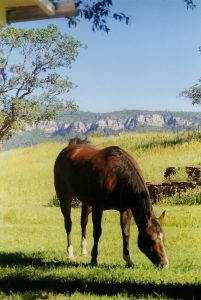
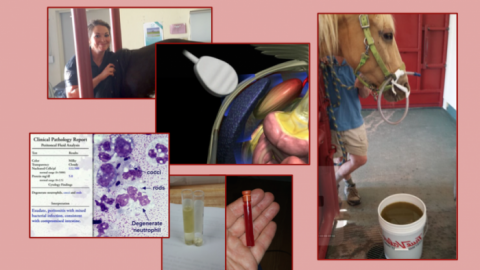
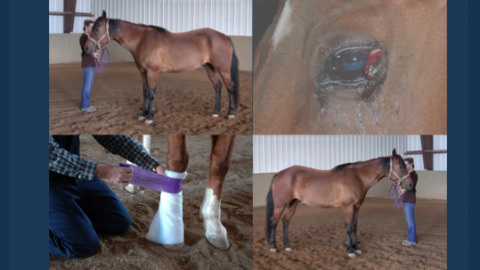
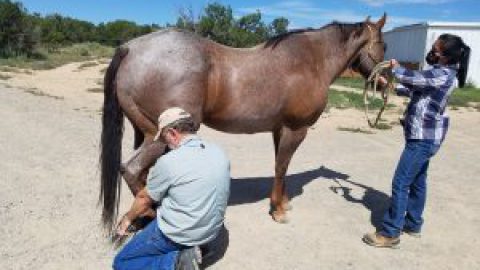
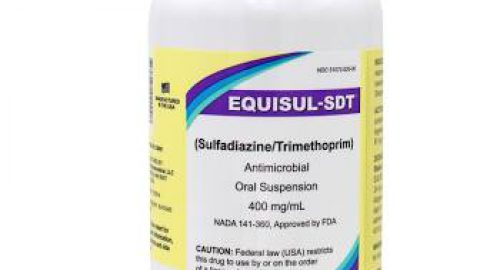
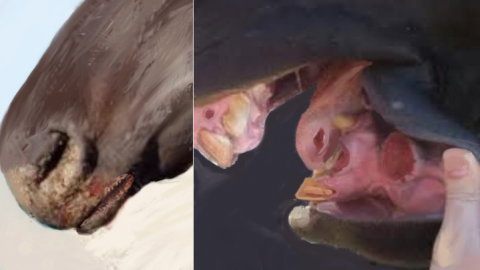
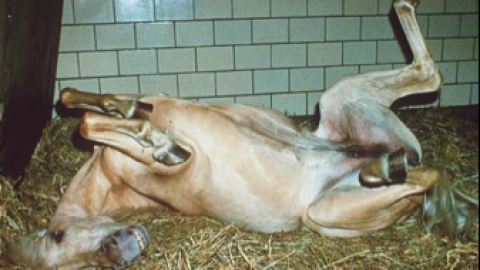
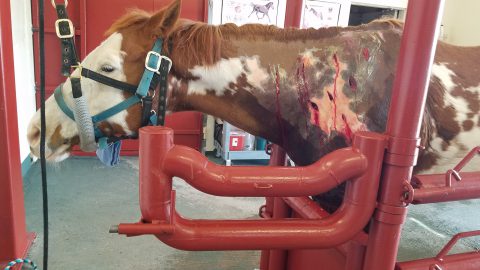
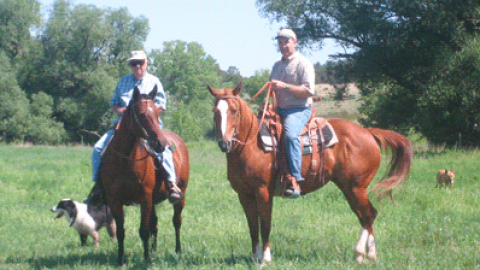
Satchmo will be 30 years old on January 1st, his collective Thoroughbred birthday, and I am dreading the eventual Letting Go Day, whether I make the decision or he does it first. We all want to spare our pets a bad end, and the euthanasia way is so gentle. So far, Satch is spry and happy and in no apparent chronic pain, just profoundly lame with the big bone-chipped front knee that he can hardly bend, yet still he manages to gambol around after his girls. He gets his “glop” twice a day with so many of his teeth having fallen out or been pulled. He is a ‘war horse,’ still kicking and whinnying and interested in life. I will give him all the quality time he has coming. Thanks for your wonderful article, you are truly a great writer and a great vet.
That was a powerful, brilliantly told, and achingly clear insight into your side of the relationship with your equine patients. I, of course, remember being there with you for Navigator’s final goodbye, and I remember all the steps you described for Jackson; it is impossible not to cry for him and the others even when it is the right thing to do. Animals do seem to rally at the end, as I suppose is their way of saying goodbye to their friends. I had a very sick Doberman that I carried in to Canyon Crossroads Hospital many years ago, and suddenly he got up, wagged his tail, ate some dog biscuits, and rallied remarkably, right before he fell over and died from a massive heart attack. The vet said that she had seen many animals over the years act coherent and “normal” right at the end, and so it was not that uncommon. People do it too.
(my first comment may have been too long so submitted again)
A vet I worked with used to say, “Euthanasia is the last thing you can do FOR your beloved pet.” I never understood that fully until I watched my own mother suffer for years, before finally being released from that body. I realized what a gift euthanasia is. It is never an easy decision, nor should it be. I make the decision with the knowledge in my brain, respect for the life in front of me, and the love in my heart. I am usually the one with the syringe in my hand. I always picture the critter happy and pain free.
Thank you for sharing.
Many many beautiful souls also haunt me, and I relive the attempts to save a life, especially those that couldn’t be saved. And this resonates: “many miserable horses seem to show a glimmer of improvement that always makes me question that irreversible decision.”
A burden and a blessing.
Compassion is a gift.
Pam